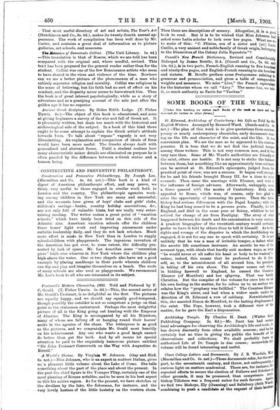The Memoirs of Benvenuto Cellini. (The Unit Library. le. 4d.)
—This translation is that of Roscoe, which we are told has been compared with the original and, where needful, revised. This tea t has been prepared for the general reader rather than for the student. Cellini was one of the few Renaissance artists who seem to have shared in the vices and violence of the time. Nowhere can we see a better picture of the phenomenon of a man who entirely separates religion and morality. Cellini was religions in the sense of believing, but his faith had no sort of effect on his conduct, and the disparity never seems to have struck him. Thus the book is of great interest psychologically, while as a story of adventure and as a gossiping account of the arts just after the golden age it has no superior.










































 Previous page
Previous page